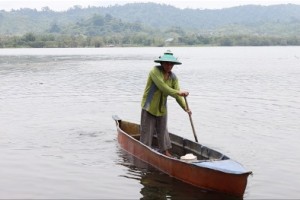MARAWI CITY--Amidst the conflict, economic instability, and climate change, Munaim Gandawali, a 46-year-old Maranao fisherman from Tuca-Ambolong, Marawi City tells the harsh reality of his community’s situation in Lake Lanao, underscoring the importance of empowering communities to build resilience and adapt to the challenges that threaten their way of life.
Lake Lanao is the largest lake in Mindanao. It has been the lifeblood of Maranao communities for centuries. Hence, they were called the “people of the lake”.
But in recent years, conflict, economic instability, and climate change have threatened the lake's ecosystem, and with it, the livelihoods of those who depend on it.

Munaim is one of the many Maranao fishermen who depend on Lake Lanao for their livelihood. But when the Marawi Siege happened in 2017, they were forced to leave their place and were unable to fish and provide for their family. They lost their homes as well as their source of income.
“Before, I had a good catch enough to sustain my family. But now it has changed. It is slowly decreasing. Our livelihood was affected. Especially when the Marawi Siege happened, our houses and our livelihoods were disrupted. We had to flee from our homes with nothing. To this day, we still feel the hardships of life brought by the siege,” said Munaim.
More so, because of climate change, the lake appears to be producing fewer fish than before, which makes it even more challenging for Munaim and his fellow fishermen. Munaim even considered the possibility that they were being punished for something.
That's when World Vision stepped in. Through the Childhood Rescue project, World Vision provided 100 families in the most fragile areas in the Philippines with livelihood materials support, and training to begin again through income generation activities.
Munaim was among the fishermen who received cash assistance to support their livelihood and especially children's needs. Through collaboration, Munaim was able to fish again and provide for his family.
“I do fishing because this is the only job I know and it is halal. Not that I am unable to do other jobs, but I have a strong faith in Allah (SWT) to do my work in a halal way, not the “big-time” business (selling drugs) which is easy money and haram (unholy) in Islam. As a pious Muslim, I do not want to earn millions from unholy practices. I would rather earn a peso in a halal way,” said Munaim.
But the support from World Vision did more than just sustain Munaim’s livelihood along with other fishermen in his community. It empowered him to build resilience and adapt to life’s challenges.

Lake Lanao is their life. He has been fishing here all his life from his childhood to becoming an adult and a family man. The lake enabled him to provide for his family, for himself, and his community.
Munaim also shared how happy he is to have raised amazing and intelligent kids. He is grateful that he was able to provide for his family in a most Godly way through fishing.
“I want my children to have an education because I do not want them to be like me [an illiterate], I do not know how to fill up the form, just like this, I do not know how to speak in Filipino/Tagalog. I am afraid that my children would end up being like me, that is why I really sacrifice and strive hard to send them to school,” said Munaim.
He hopes that more people, especially the authorities, will recognize the importance of sustaining the lake, which is the Maranao’s home and life. According to him, “Without fish, there can be no life.” (World Vision PH/PIA-10 Lanao del Sur)




